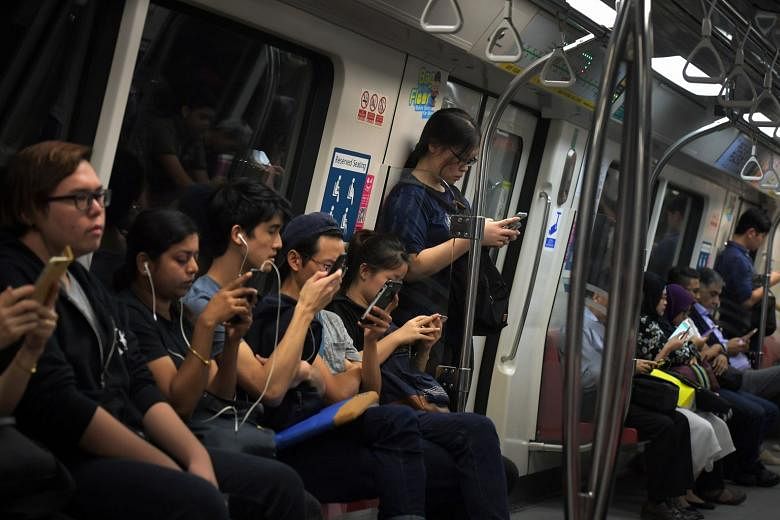The year is slipping to a close and one of the things I've learnt this year is both how important social media is, and how insignificant it really is.
For a few months earlier this year, I was a social media junkie. WhatsApp, Facebook and LinkedIn were the last things I checked at night; the first things I looked up when I woke up. I took part, intermittently, in a poetry-writing group exercise in April where people write short lines to various prompts.
When I sent each missive into cyberspace, I would check my status updates to see how many "Likes" I got. After weeks of being borderline Facebook-addicted, I spent one evening offline. Of course I had to declare my offline intention on Facebook. I wrote: "Only 9pm. Nothing urgent to fix at work. (Touch wood!) No dinner to attend. No family member to entertain. Resisting Netflix. Gonna go offline and curl up with a nice book - a real book book. Bliss for a couple of hours. Then sleep."
When I went back online the next day, I was chuffed that the simple post had gotten 64 likes.
As I chugged along through the year, it occurred to me that I was getting a bit too fond of my social media interactions. I was getting to like all those positive strokes of Likes and Comments. Soon, I was checking several social media and messaging apps throughout the day.
Then I decided to spend some time in Australia. I've been in Melbourne for the past month or so; on leave and then telecommuting. (I'm lucky to have a job that lets me work from outside Singapore so long as there is a secure VPN connection.)
Social media becomes a way to remain in touch with friends; but I stopped obsessively checking my accounts. Ethereal things of the digital world faded away.
Here, the weather reigns supreme. In the weeks I've been here, the temperature has ranged from 35 deg C sweltering heat one day, to 10 deg C the next. One weekend, the entire state of Victoria was on high alert for massive floods touted to be a once-in-a-century event; I cancelled all travel plans that weekend and stayed indoors.
In the end, the worst of the floods did not materialise but there was sporadic flooding across Victoria. People took it in their stride, so inured are they to extreme weather. On previous visits, I'd been hit by thunderstorms that led to massive power failures, and by shrieking winds that can literally blow you off your feet unless you grab on to a lamp post, and rock your car side to side.
When life confronts you with its sheer physicality, your first resort is not to social media. It is to survival and getting shelter, somewhere safe. Facebook updates won't help you cope with lashing rains or winds; in fact, it won't even survive a power outage or a breakdown of your Wi-Fi connection. You may take to Facebook to share photos or to rant; but an extreme weather event reminds you that life is real, it happens in the here and now, and it assaults your five senses.
Social media is a mere repository of life, not life itself.
So this morning, while mulling over what to write in my weekly blog, I prepared for the article not by checking what people are saying on social media. Instead, I spent a pleasant hour in the garden, pruning the rose bushes, and then snipping a few bunches of blossoms to put into vases.
Then it was time to water the garden. I never knew until recently, just how therapeutic it is to water plants. Armed with a hose and nozzle, I walked around in a placid trance, watering each bush. Roses need a lot of sun and a lot of water. Watering each bush takes a few minutes. To mark time, I said a few Hail Marys per bush. There are about a dozen rose bushes in the garden, so watering them all, and the other shrubs, takes quite a long time.
The summer sun beat down, but I was well protected with sunscreen, hat, gloves and a long-sleeved top. The air was cool, the bees hummed, and, after a while, time stood still.
The hour slipped by. I have no photos to remember it by; no smart status update to post; only a memory of a lovely hour, and a deep sense of gratitude for life. I could still post about this - come to think of it, I will be posting about it when I share this article on my Facebook page - but for those few moments, that time was special, because it was just time happening; just time spent watering the garden, with no expectation and no pressure; meaning nothing more than what it was - time spent watering the garden.
Life happens, and sometimes we want to share them with others on social media. Sometimes we don't. That is the proper order.
It should not be: Let's do things so I can talk about and share them on Insta, Snapchat, Facebook.
I was wondering if the sense of social media fatigue I experienced was just me; but it turns out, it's not.
Signs of social media fatigue are cropping up.
Twitter's monthly average user subscriber growth was flat in the second quarter of 2017.
Facebook's user base is growing, and its monthly average user exceeds two billion, as more people across the world flock to it. It is, however, losing ground among teenagers and millennials.
Statistics show that Facebook's organic reach has been declining since 2013. Engagement with each post sent out by brands and marketeers has gone down 20 per cent in 2017. (Reach refers to the number of people who see your post; engagement refers to how many Like or Comment or Share it).
Those of us who are active on Facebook might have noticed that our News Feeds are looking distinctly less interesting these days. Gone are the article shares or news videos by friends of magazine or newspapers they've read; instead, I get a lot more photos of friends' activities and personal lives. These are nice, but less interesting.
These shifts are in part due to Facebook's own tinkering with its algorithm that now privileges your friends' personal posts over posts from brands or news organisations. If this continues, Facebook will resemble more of what it started out as - a space for college mates to hang around and share goofy photos - than what it was reaching to be - which is a global community for people to share ideas and experiences.

A thorough survey by Deloitte of consumer mobile use trends suggests that heavy usage of smartphones and devices - which are often used to check social media - is plateauing. People check their phones 47 times a day - which is high, but no higher than in past years. More than 80 per cent reach for their phones within an hour of sleeping or waking; nearly half check it in the middle of the night.
The report noted: "The number of times we look at our phones each day has not increased over the past three years, and the urgency with which we reach for our phones has plateaued as well… Even the number of apps consumers download and install on their devices has more or less plateaued. The average number of apps installed has increased only marginally to 23, from last year's 22. Asked for their reasons for not installing more apps, 57 per cent of respondents said they didn't see the need for them, while 25 per cent maintained they did not have enough space on their phones for more."
Some thought they were using their smartphones too much, noted the report. "And which age group expresses the highest levels of concern? Seventy-five per cent of those ages 25 to 34, and 72 per cent of those ages 18 to 24 report that they "definitely" or "probably" use their phone too much… Almost half (47 per cent) of all ages said they try to reduce or limit their smartphone use. Again, that trend is led predominantly by the two youngest age groups."
It isn't just users who show signs of social media fatigue. A few social media founders are turning into jeremiads warning about overuse of the platforms they created.
YouTube's co-founder and former chief executive Chad Hurley said in January that excessive checking of social media was unproductive. He predicted: "I think there's going to be a sense over the next few years, that there's going to be a social [media] fatigue that sets in. There's so much information that is being produced, that people start tuning out."
Microsoft founder Bill Gates didn't let his kids use smartphones till they were 14; Apple's Steve Jobs didn't let his play with the iPads he invented.
In November, Sean Parker, one of the co-founders of Facebook, was reported as saying that he thinks social media is damaging the health of humans' brains. "It literally changes your relationship with society, with each other... It probably interferes with productivity in weird ways. God only knows what it's doing to our children's brains."
He admitted that Facebook and its successors were deliberately designed to consume as much time and attention as possible from their users, to create "a social-validation feedback loop" and that the exercise was all about "exploiting a vulnerability in human psychology".
As many psychologists have noted, social media is designed around psychological theories about rewards and behaviour. For example, the practice of having people click Likes or Shares does two things: It gives a series of quick, immediate positive rewards to the person putting out the original post; and it engages the person who clicks Like or Share, turning a casual, bystander reader into a participant. Over time, such practices lock users into the social media ecosystem and users get addicted to the rewards (number of Likes) in it.
When we look back on this decade, we would probably think of the smartphone and social media as key inventions that changed our lives. But it is even odds whether we will say it enhanced our lives, or made it more stressful and less satisfying.
Meanwhile, there is an easy fix if you find yourself checking your phone for your social media updates too often. Stop and smell the roses. Or at least take a walk. No, Pokemon hunting while in the park doesn't count.


